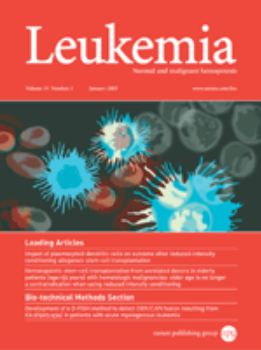Regulation of metabolic adaptation and leukemia progression by MUSASHI2-DEPTOR-KIF11 axis.
IF 13.4
1区 医学
Q1 HEMATOLOGY
引用次数: 0
Abstract
Amino acid homeostasis is critical for leukemic cell survival, with the mTOR pathway playing a central role in sensing and responding to nutrient availability. DEPTOR, a component and negative regulator of mTOR complexes, has been extensively studied in solid tumors and multiple myeloma, but its role in acute myeloid leukemia (AML) remains unclear. Here, we identify DEPTOR as a key regulator of leukemia progression through its interaction with KIF11. DEPTOR expression is transcriptionally induced by ATF4 and post-transcriptionally stabilized by MSI2, which binds to DEPTOR mRNA and prevents its degradation. DEPTOR is highly expressed in leukemia stem cells (LSCs) and is associated with poor clinical outcomes. Functionally, DEPTOR loss impairs leukemogenesis in both AML and blast phase chronic myeloid leukemia (bpCML) models, without affecting normal hematopoietic stem cells. Mechanistically, DEPTOR stabilizes KIF11 by preventing its ubiquitination and proteasomal degradation, thereby ensuring proper mTORC1 localization and metabolic adaptation during nutrient stress. Collectively, our findings establish the MSI2/DEPTOR/KIF11 axis as a critical driver of leukemogenesis and a promising therapeutic target for aggressive myeloid leukemias.MUSASHI2-DEPTOR-KIF11轴对代谢适应和白血病进展的调控。
氨基酸稳态对白血病细胞存活至关重要,mTOR通路在感知和响应营养可用性方面发挥着核心作用。DEPTOR是mTOR复合物的一种组分和负调节因子,已在实体瘤和多发性骨髓瘤中得到广泛研究,但其在急性髓性白血病(AML)中的作用尚不清楚。在这里,我们通过与KIF11的相互作用确定了DEPTOR是白血病进展的关键调节因子。DEPTOR的表达由ATF4转录诱导,并由MSI2转录后稳定,MSI2与DEPTOR mRNA结合并阻止其降解。DEPTOR在白血病干细胞(LSCs)中高表达,并与不良临床结果相关。在功能上,DEPTOR缺失损害AML和母细胞期慢性髓性白血病(bpCML)模型中的白血病发生,而不影响正常的造血干细胞。在机制上,DEPTOR通过阻止KIF11的泛素化和蛋白酶体降解来稳定KIF11,从而确保营养胁迫下mTORC1的适当定位和代谢适应。总的来说,我们的研究结果确定MSI2/DEPTOR/KIF11轴是白血病发生的关键驱动因素,也是侵袭性髓性白血病的一个有希望的治疗靶点。
本文章由计算机程序翻译,如有差异,请以英文原文为准。
求助全文
约1分钟内获得全文
求助全文
来源期刊

Leukemia
医学-血液学
CiteScore
18.10
自引率
3.50%
发文量
270
审稿时长
3-6 weeks
期刊介绍:
Title: Leukemia
Journal Overview:
Publishes high-quality, peer-reviewed research
Covers all aspects of research and treatment of leukemia and allied diseases
Includes studies of normal hemopoiesis due to comparative relevance
Topics of Interest:
Oncogenes
Growth factors
Stem cells
Leukemia genomics
Cell cycle
Signal transduction
Molecular targets for therapy
And more
Content Types:
Original research articles
Reviews
Letters
Correspondence
Comments elaborating on significant advances and covering topical issues
 求助内容:
求助内容: 应助结果提醒方式:
应助结果提醒方式:


